The Smooth Collie is a medium to large-sized herding dog breed that primarily originated in Northern England and Scotland. (Weight = 50-75 pounds, Height = 22-26 inches at the shoulder, per AKC standard.) They are known for their intelligence, versatility, and loyalty, making them excellent working dogs and family pets.
As you might have guessed from the name, the Smooth Collie has a short double coat – not as long as a German Shepherd, not as short as a Boxer – that requires minimal grooming compared to their Rough Collie counterparts.
Other than coat type, Rough Collies and Smooth Collies are alike in their distinctive appearance: almond-shaped eyes, long muzzle, and a gentle expression lending them an air of sophistication. The Smooth Collies’ shorter fur displays their body structure, making it is easier to see the genetic connection between Collies and their more distant ancestors: Greyhounds, Scottish Deerhounds, and Borzois.
In this article, we’ll explore the history of Smooth Collies, their characteristics, and how they differ from Rough Collies. We’ll also discuss how to find a reputable breeder and the proper care for these lovely dogs, including common health issues to watch out for.
Table of Contents
The History of Smooth Collies
Some say the Smooth Collie’s early origins may date back to the 1500s. It is believed that the breed originated from a mix of Scottish and English sheepdogs.
Though the days of the purebred fancy had not yet arrived, these [smooth-coated Collie] dogs were thoughtfully bred, and crosses of Shepherd’s Dog, Ban Dog, and the Drover’s Dog type were consciously made to improve the dogs’ performance. Rough/Smooth crosses were common in these early days and continue today in the United States, though prohibited in England. – Doris Werdermann of Dorelaine Collies, from “The Smooth Collie”
While the longhaired Collies were typically used for sheepherding and as flock guardians, the shorthaired Collies were often used for herding too, as well as over longer distances to drive stock to market. Both Collie types were prized not only for their abilities but for dedication and loyalty to their owners.
In the mid-1800s, Queen Victoria became an admirer of the breed, and her interest in Collies helped to increase their popularity throughout Britain. Dog fanciers subsequently made efforts to develop them into specific purebred type. Both varieties were classed together in dog shows until the late 19th century, when they were separated into two distinct breed categories.
As the Collie breed gained popularity, they were exported to other countries, including the United States, where they continued to be used as a working dog and beloved companion. The Smooth Collie has been recognized by the American Kennel Club (AKC) since 1885, and the breed has become well-known in popular culture, thanks in part to the famous fictional Rough Collie, Lassie.
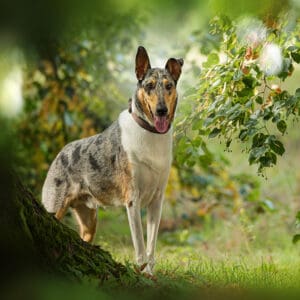
Are Smooth Collies Rare? Exploring the Breed's Popularity
When people question, “Are Smooth Collies rare?” the answer is somewhat nuanced. Their availability really depends on the country/region of the world. While not as common as some other breeds, in the USA they are by no means on the verge of extinction. In the UK however, Smooth Collies are considered an endangered breed, since per their Kennel Club they are a separate breed from Rough Collies.
The Smooth Collie so far has not attained the general popularity of the Rough Collie, and I do find that to be unfortunate. The Smooth has all the wonderful endearing qualities of the Rough in his heart and soul. And the Smooth has a beauty of his own – plus an appealing lack of combing and brushing time. – Patricia Roberts Starkweather, from The Magnificent Collie.
According to the AKC, Smooth Collies rank 139th out of 197 breeds in numbers of dogs registered annually in the United States, while their Rough Collie cousins rank significantly higher at 38th. Yet Smooth Collies are now gaining popularity as Service Dogs – including Guide Dogs for the blind.
One reason for the Smooth Collie’s lesser popularity may be coat length. Many people are drawn to the luxurious, long fur of the Rough Collie, while the Smooth Collie’s short coat can be seen as less attractive or hound-like. However, the Smooth Collie’s coat has advantages in not matting or experiencing excessive seasonal shedding. In comparison, Smooth Collies will have continual single-hair shedding not unlike Labrador Retrievers.
To further contribute to Smooth Collies’ rarity, they are clearly overshadowed by their Rough Collie relatives who are associated with Lassie. Since the 1940s, Lassie iterations have been represented in media by books, movies, and TV shows. Rough Collies are even colloquially called “Lassie dogs.”
Many people are simply unaware there are two distinct Collie varieties and assume that all Collies have long fur. As a result, Smooth Collies may be entirely unknown to prospective dog owners.
Characteristics of Smooth Collies
Smooth Collies are known to be good with children and other animals, making them a great choice for households with multiple pets. They are prized for their adaptability, empathy, and a desire to see their owners happy. In addition to a friendly disposition, Smooth Collies are highly trainable and excel in various dog sports, such as obedience, herding, and agility.
Nowadays, more Smooth Collies are being used as Service Dogs, due to their low-maintenance care and high emotional intelligence. Smooth Collies are often considered to be part of the “Fab Four” for Service Dog breeds, following the three more popular choices of Labrador Retriever, Golden Retriever, and Standard People. Many Collies are large enough to be used for light Mobility Assistance Service Dog work. They are particularly sought after as Psychiatric Service Dogs for people who suffer from PTSD or anxiety disorders, for instance.
A Collie’s keen sense of smell and natural tracking abilities also make them suitable for search and rescue work. As herding dogs, it was often necessary for them to find lost livestock, so it is only natural for those instincts to translate into finding lost people.
The Smooth Collie’s coat is short and dense, with a coarser outer coat and a soft, thick undercoat. Lovers of the breed affectionately refer to Smooth Collies as “Smoothies.” They come in a variety of colors, including sable and white, blue merle, tricolor, and white – although this not an accepted color in the UK.
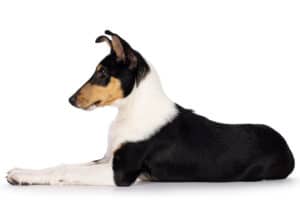
Common Health Issues in Smooth Collies
As with any breed, Smooth Collies can be prone to certain health issues. Below is a brief list of discussion of common concerns within the breed.
Eye Disorders
Collie Eye Anomaly (CEA) is a genetic eye condition prevalent in several herding breeds. It can cause vision impairment or blindness, but for dogs who are affected by this disease, only about 10% will go blind. Most Rough Collies and Smooth Collies have CEA, but many are merely carriers.
Previously, only veterinary ophthalmological eye checks could show the presence of this disease, but due to the advent of genetic testing the number of CEA affected or carrier Collies is steadily decreasing. Reputable breeders will test their dogs for the CEA gene and only breed dogs who are clear of or are carriers of the gene.
Progressive Retinal Atrophy (PRA) is a group of genetic eye disorders that cause the retina to degrade over time, leading to vision loss. Though it affects many breeds, it is not nearly as common in Collies and is steadily being bred out. DNA testing is also available to identify carriers of the PRA gene.
Hip Dysplasia
Hip dysplasia is a genetic condition in which the hip joint doesn’t develop properly, leading to arthritis and pain. Though not nearly as prevalent in Collies as other large-breed dogs, some breeders will have their dogs’ hips evaluated by a veterinarian before breeding. However, testing does involve anesthesia and x-rays, so some Collie breeders may be unwilling to subject their dogs to it.
Multidrug Resistance Gene Mutation (MDR1)
The Multidrug Resistance Gene Mutation (or MDR1 as it’s commonly called) affects dogs by making them more likely to experience reactions to some chemicals. Simply put, a mutation is a change – however slight – to a genetic code, and this particular mutation relates to the MDR1 gene (also known as ABCB1 gene). For a canine in the wild, it wouldn’t be an issue; but in this chemical world we live in it unfortunately is.
Many herding breeds (most commonly Collies and Australian Shepherds) have a mutation at the MDR1 gene that makes them more sensitive to the negative effects of certain medications. – VCA Animal Hospitals
It can be a bit complicated – follow the above link if you want a more technical explanation – but the main thing to know is many Collies are essentially allergic to some drugs. This link will take you to a list of drugs to limit or avoid. Some are found in anti-diarrhea medicines, drugs for cancer treatments, anesthetics, and preventive medications for internal and external parasites. With MDR1 dogs in mind, we put together a list with ratings of many heartworm and flea/tick prevention products.
Since MDR1 was not discovered until about 10 years ago, there is still work to be done to eradicate this mutated gene. Now that the gene has been isolated, genetic testing is available to breeders. Awareness of MDR1 is on the rise, but it is best to find a breeder and a veterinarian who are knowledgeable about this condition.
Allergies
Smooth Collies can be prone to different types of allergies, which can cause skin irritation and itching. Regular grooming, an appropriate high-quality diet, and consistent flea preventive medications can help minimize the risk of allergies.
Food allergies will often manifest in itchiness around a dog’s feet or muzzle. Signs can include frequent licking/gnawing on reddened skin between paw pads, redness/hair loss around the muzzle, or persistent scratching/rubbing their muzzle on the ground. Many canines appear closer to omnivores than straight carnivores – though this is hotly debated! Collies especially may not do best on a grain-free diet, and foods containing rice are typically processed well. A healthy, glossy Collie coat indicates an ideal diet.
The food protein source can be another irritant. Some Collies have food sensitivities to different types of meat. While some dogs may have negative reactions to chicken (or related fowl like turkey), others may react badly to beef (and sometimes even related meat from grazing animals such as bison/buffalo and elk or deer). Like most dogs, Collies do not process pork well at all.
Flea allergies are a regular concern, and symptoms usually present on the back end over rump, tail, and hind legs. A good flea preventive can help tremendously, but some dogs may also need an allergy aid such as Apoquel or Cytopoint.
Allergies are a plague to many breeds of dogs, not just Collies, and may require consulting with your local veterinarian or a canine nutritionist through platforms such as Balance It.
Caring for Your Smooth Collie
Though Smooth Collies are relatively low-maintenance dogs, they still require regular care and attention to ensure their health and happiness.
Smooth Collies will of course need regular exercise and mental stimulation. As a herding breed, they are fairly energetic and need daily walks, playtime, or participation in dog sports to stay physically and mentally stimulated. While most Smooth Collies have average energy and medium drive, there are of course always exceptions to the rule.
They usually have a good on/off switch, meaning they will adapt their energy level to yours, though this is much more likely to be the case once a dog has matured past puppyhood. If you’re active, your Collie will be delighted to join you in any activity. If you need a lazy night in, your Collie will be content to relax with you.
Grooming is still essential. Though a Smooth Collie’s fur is medium length, it will benefit from regular brushing to keep the coat looking its best. This also helps you, since removing loose hair with a brush means less shed hair around the house. And don’t forget regular nail trims, ear cleanings, and dental care to prevent potential health issues!
Lastly, proper training and socialization are crucial for raising a well-adjusted Smooth Collie. These intelligent dogs are quick learners and respond well to positive reinforcement training techniques. Early socialization with a variety of people, animals, and environments will help your Smooth Collie develop into a confident and well-mannered companion.
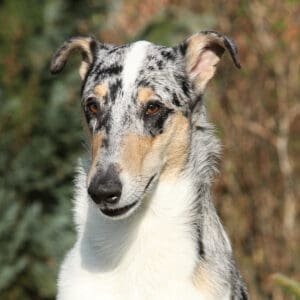
The Difference Between Smooth Collies and Rough Collies
Clearly, coat type is the primary difference between Smooth Collies and Rough Collies. As mentioned earlier, the Smooth Collie has a short, sleek coat, while the Rough Collie has a long, abundant coat. As a result, Smooth Collies are more often to be seen in the Southern United States, while Rough Collies thrive in the snowy North.
In terms of temperament and personality, Smooth and Rough Collies are quite similar. They are affectionate with their people and may be “one-family dogs.” Though polite and friendly if approached in public, they might be disinclined to attract the attention of strangers. Dogs can be introverts too! However, some Smooth Collie enthusiasts argue that the breed is more outgoing than the average Rough Collie.
Both Roughs and Smooths will go out of their way to cheer up their people and make them laugh, yet some owners swear their Smooth Collies have a more goofy, clownish personality.
Perhaps partially due to having less fur, Smooth Collies can sometimes be more energetic than the Rough Collie, making them better suited to active families and working roles.
But since both types of Collies are considered the same breed by many kennel clubs, (AKC included), personality differences may be unapparent when subject to the same breed standard. In fact, Rough Collies and Smooth Collies can be born in the same litter.
How to Find a Smooth Collie Breeder
Finding a reputable Smooth Collie breeder may be more challenging, given the breed’s relative rarity. However, with some patience and research, you can locate a breeder who is dedicated to preserving the breed’s health, temperament, and conformation.
National and local breed clubs often maintain lists of reputable breeders. It can be especially beneficial to visit sporting events, see Smooth Collies in action, and chat with their owners. Online forums and social media groups dedicated to Collies can also be valuable resources for connecting with fellow enthusiasts who may have breeder recommendations.
We have compiled both a Collie rescue directory and a Collie breeder directory, but these should be utilized as starting points, not endorsements.
When visiting a potential breeder, make sure to ask about health testing for common issues within the breed, such as Collie Eye Anomaly and Multidrug Resistance gene. An ethical breeder will be more than happy to discuss these concerns and provide documentation of health testing for their breeding dogs. Also, take the time to observe the breeder’s dogs and their living conditions to ensure they are well-cared for and socialized.
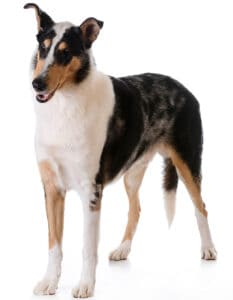
Conclusion: Appreciating the Uniqueness of Smooth Collies
While Smooth Collies may not be as common as some other breeds, their unique qualities make them a fantastic choice for the right family. So, are Smooth Collies rare? Perhaps in numbers for now, but they are becoming more popular in the show ring, at performance events, and as Service Dogs. So, there is reason to believe their popularity will increase as family pets also. They are certainly treasured by those who have come to know and love this exceptional breed.
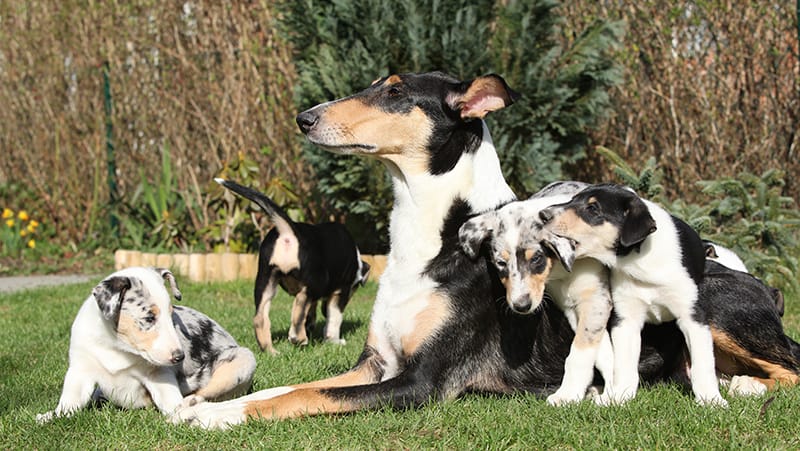

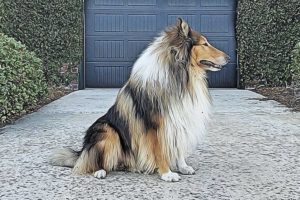
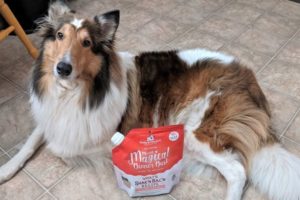

I had never heard of a smooth coat collie until I saw 1 on a dog adoption page. He had vision problems that were CEA related and I fell in love with his appearance. I felt I would be a good ‘dog mom’ to this boy as I’d worked in special education programs and knew how to adapt the environment to meet someone’s needs. I was so lucky to be the applicant chosen to adopt this 5 month old beauty who I named Satchel. Satchel was dignified, mischievous, amusing, peaceful and eager to please. He lived to be 14 years old. I think about him often and regret that it wasn’t until I was in my 50s that I discovered what a joyous breed collies are. I truly enjoyed reading this article.
Thank you – I loved hearing about Satchel! Sounds like he was a gem and you treasured him as such. Satchel is such a great name, too. I’m glad you had him as long as you did! That’s a good long life for a large breed dog. You never truly get over losing a dog, but every extra year we have with them counts. ❤️
Hi Emily-loved your article about Smoothies. Dani (Turnberry’s Dan River Moon) is our 3rd Collie and 1st Smoothie. All of them have been wonderful, unique, beautiful individuals. Dani is indeed a clown, and deeply attached to our cat. And Dani, at 5 years, has yet to meet a person she doesn’t like. She only sheds once a year…. January to December. We call it Collie glitter.